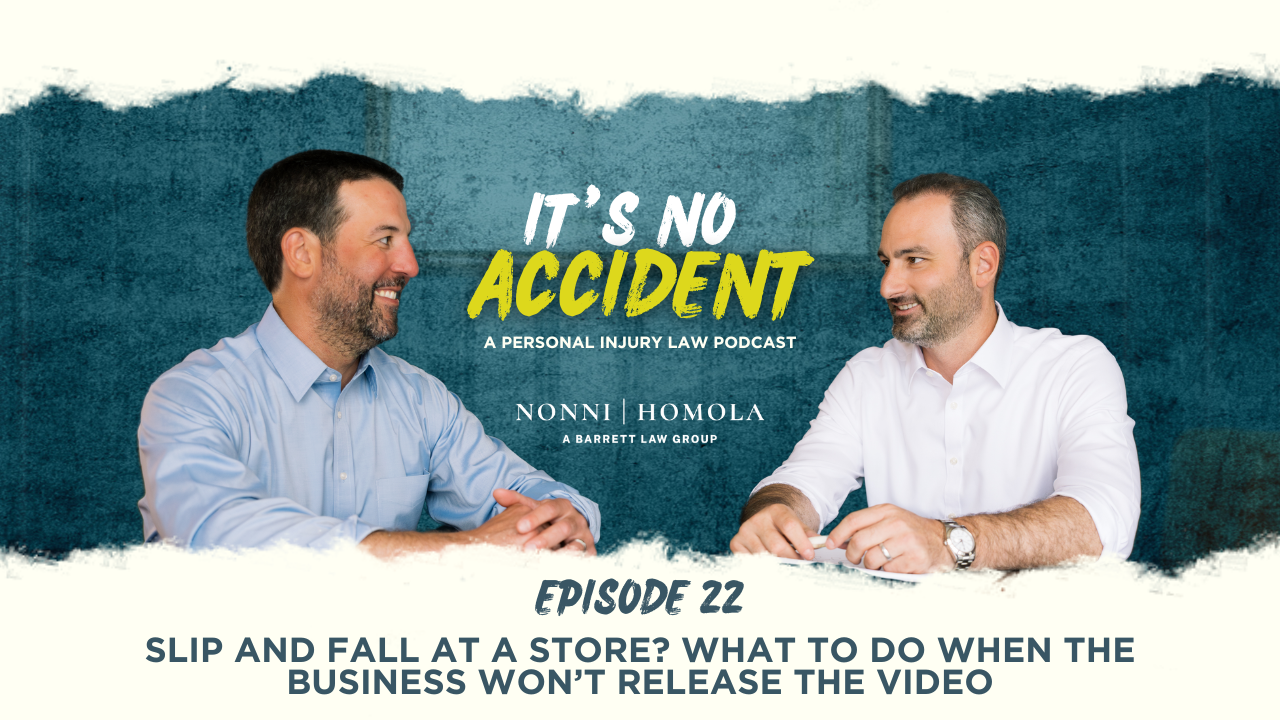
Episode Description
In this episode of It’s No Accident, Jaeson and Mark are answering listeners’ questions, including one from a viewer about a slip and fall accident, and the business owner is refusing to provide video footage.
Jaeson and Mark break down what really happens behind the scenes when businesses refuse to hand over surveillance footage after a slip and fall. They explain why store owners aren’t legally required to share video before a lawsuit, how to protect your claim with a video preservation letter, and why timing is everything when it comes to securing critical evidence.
They also dive into Florida’s notice requirement—why simply slipping and falling isn’t enough to win your case—and how attorneys prove whether a business knew (or should have known) about a dangerous condition.
From understanding your rights to knowing what to do in the moments after a fall, this episode is a must-listen for anyone who’s been injured on commercial property and wants to know how to protect their case from day one.
Episode Transcript
Since the last time we filmed this podcast, we asked our listeners and followers on social media to send us some questions — things they wanted to hear about. Interestingly, many of the questions we received were similar to the ones we often get from potential clients. These issues come up all the time.
One question that stood out was: “I slipped at a convenience store in a puddle leaking from a faulty cooler. The owner is refusing to give me any video footage. What should I do?”
Well, first of all — call us. That’s the first thing you should do. But if that person were to call, where would you start with answering that question?
You’re right — this comes up all the time. These days, there are cameras everywhere: inside stores, outside stores, you name it. Anytime someone has a slip and fall or an injury in a business, people often assume, “Oh, it’s on video, just go get it.” They think it’ll be easy to prove the case with video.
The reality is, before a lawsuit is filed, we have no way to force a business owner to hand over that footage. The first thing we do is send a preservation letter to the business, demanding that they save the video and not erase, record over, or delete it. We’ll also politely ask for a copy of the footage — but nine times out of ten, they won’t give it to us, especially if it helps our client.
The only real way to get the video is by filing a lawsuit. Once that happens, we can request it during the discovery process. Technically, it’s not a subpoena, but for simplicity’s sake, we can then legally compel them to turn it over. Of course, that creates a new round of arguments from the defense about why they shouldn’t have to give us the video right away — usually insisting on taking our client’s deposition first.
From experience, the better the video is for our client, the harder it is to get. On the flip side, if the footage helps the defendant, we usually hear from their insurance adjuster or attorney almost immediately, saying, “There’s no liability here. The video shows the water was only on the floor for five seconds before your client fell.”
And that’s actually good information to have upfront. It might not be great for the person who fell, but it’s better to know early on than to spend months on a case that can’t be won. Because in Florida, it’s not enough to show that you slipped and fell in a store — you also have to prove that the owner knew or should have known about the dangerous condition.
So, if a child dropped a drink ten seconds before you came around the corner and slipped, there’s no case. But when a business refuses to release video, that raises suspicion. If it was bad for our client, they’d show it right away. When they don’t, it usually means there’s something they don’t want us to see.
That’s why one of the most important steps you can take is to contact an attorney immediately so they can send that preservation letter. If you don’t have an attorney yet, put something in writing to the property owner or store manager and keep proof that you gave it to them. Under Florida law, businesses have no legal duty to save surveillance footage unless they have reason to believe a claim might be made.
The easiest way to make sure there’s a “reasonable anticipation of a claim” is to notify them in writing that you intend to make one and ask them to preserve the video. Just being injured isn’t enough under the law — there has to be notice. So if you send that letter or email, keep a copy for your records.
Many people say, “Well, I sent them a letter,” but when we ask if they kept a copy, they didn’t. And conveniently, the business doesn’t have one either. So, you always want proof that you sent it.
I understand the argument that it could be burdensome for businesses to store unlimited amounts of video forever — that made sense years ago when everything was recorded on VHS. But now, with digital storage, it’s not nearly as difficult. In my opinion, once an incident report is created or a manager is notified that someone was hurt, the business should have a duty to preserve that footage.
If no one at the store knows about the fall, then there’s no duty to save anything. But as soon as they’re aware, or there’s a reasonable chance a claim will be made, that duty exists.
Another issue is how long businesses keep their footage. Many stores automatically delete or record over surveillance video after a set period — sometimes every 24 hours, every week, or every 30 days. If you wait too long to act, the video will likely be gone, even if the deletion wasn’t intentional. That’s why timing is critical — send the letter immediately.
Proving notice is often the hardest part of a slip and fall case. In this example, with a leaking cooler, you’d have to prove the store knew the cooler was leaking and failed to fix it, or that it had been leaking long enough that they should have known about it. Video is often the best way to show that.
Once we file a lawsuit and request the footage, there’s another fight — how much video we’re entitled to. The defense usually wants to give us only the 30 seconds before and after the fall, while we want 24 hours or more to see if the cooler had been leaking for days. That becomes a major point of contention.
Each of these disputes — when to produce the video, how much to produce, and under what conditions — can drag out the case for months. Courts are busy, especially in larger counties like Miami-Dade, Orange, or Hillsborough, and even in North Florida, it can take time to get hearings scheduled. That’s why cases like this can stretch on for a year or more.
Another key point for anyone in this situation: talk to a manager immediately after your fall. If you see water leaking from a cooler or any other hazard, speak to someone right away. Managers and employees are much more likely to be candid in that moment than a year later in a deposition.
I’ve had cases where a manager said right after a fall, “Yeah, we’ve had problems with that cooler for weeks. We’ve called to get it fixed, but they haven’t come out yet.” That kind of admission can be the most powerful piece of evidence in your entire case.
So, the bottom line is — act quickly. Report it, document it, send a written request to preserve the video, and talk to witnesses or employees right away. Those steps can make or break your case.


